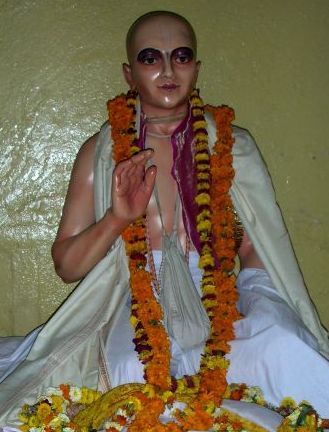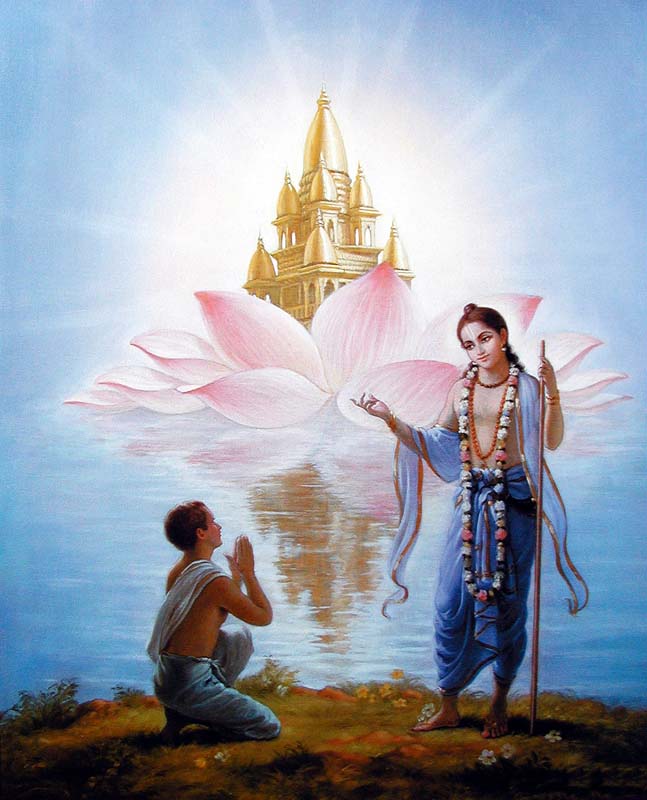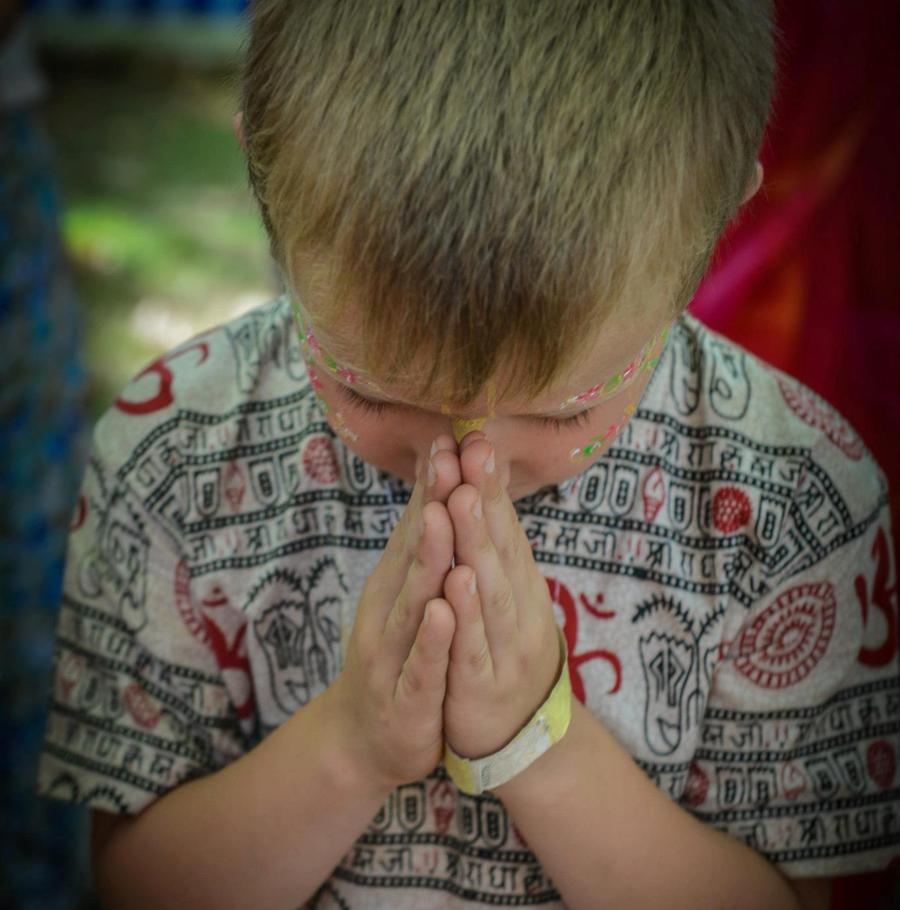
Appearing as the nephew of Shri Rupa and Sanatana Goswamis, Shri Jiva Goswami displayed all the charming features of a mahapurusa (divine person). He had lotus eyes, a high nose and forehead, broad chest, long arms, and a radiant golden body. (In the image: Shrila Jiva Goswami).
In his boyhood he made a Deity of Krishna-Balarama. Expressing his pure devotion, he would often cry while worshiping Them. After offering clothes, chandana, flowers, ornaments, and tasty sweets to Krishna-Balarama he would take some and give Maha-Prasadam to his playmates. From the beginning Jiva showed his kindness to other jivas (living entities). Jiva was so much attached to Krishna-Balarama that at bed time he would embrace his Deities and fall asleep. His parents thought he was only playing. But the villagers rejoiced to see Jiva's love for Krishna-Balarama.
In school he quickly mastered Sanskrit grammar, poetry, logic, philosophy. Shrimad Bhagavatam gave life to his life. Krishna-katha filled him with happiness. No one dared to speak to him about anything but Krishna. He toured Navadwipa-dhama with Shri Nityananda Prabhu, studied Sanskrit in Benares, and then resided in Vrindavana. After humbly serving Shri Rupa Goswami by washing his feet, preparing his manuscripts, and editing his books he received diksha.
Once the aging Vaishnava, Vallabhacharya, gave critical advice to Shri Rupa Goswami on his writing. Although much younger than the venerable Vallabha, Shri Jiva brazenly spoke in defense of his guru. Shri Rupa Goswami scolded Shri Jiva telling him to leave Vrindavana. Living in an abandoned crocodile hole in Nanda Ghat (45 minutes from Shri Rupa's bhajana kutir) , Shri Jiva Goswami began fasting. He subsisted on wheat flour, which he begged, mixed with Yamuna water. Seeing his strict self-denial, Sanatana Goswami brought him back to the service of Shri Rupa Goswami.

In school he quickly mastered Sanskrit grammar, poetry, logic, philosophy. Shrimad Bhagavatam gave life to his life. Krishna-katha filled him with happiness. No one dared to speak to him about anything but Krishna. He toured Navadwipa-dhama with Shri Nityananda Prabhu, studied Sanskrit in Benares, and then resided in Vrindavana. After humbly serving Shri Rupa Goswami by washing his feet, preparing his manuscripts, and editing his books he received diksha. (In the image: Shri Nityananda Prabhu showing Shri Navadwipa Dham to Jiva Goswami).
Shrila Prabhupada once commented on this "guru-disciple pastime." "Shri Rupa Goswami cast out Jiva Goswami to teach us, the Devotees of today, a lesson. It was not done to teach or punish Shri Jiva Goswami, who is a perfectly liberated, eternal associate of Lord Krishna. Rupa Goswami sent Jiva Goswami out of Vrindavana to teach all jivas what he wrote in Upadesamrta: vaco vegam mansah krodah vegam, jihva vegam… At all times, a Devotee should control his tongue, his speech, and always remain humble, trnad api sunicena:"
After the disappearance of Shri Rupa and Shri Sanatana Goswamis, Shri Jiva Goswami became the Gaudiya Sampradayacharya to guide all Vaishnavas in Navadwipa, Vrindavana, Jagannatha Puri. Although he was the undisputed leader, he always acted as a humble servant of all the jivas. Whenever Bengali Vaishnavas visited Vrindavana he would lovingly receive them, arrange for Prasadam and comfortable rooms, an even guide them on Vraja mandala parikrama.
A superexcellent Sanskrit scholar, Shri Jiva Goswami would compose Sanskrit verses in his mind and write them down without changing anything. Write them down means he used a metal stylus to permanently etch them in palm leaves. This inscription method left no room for erasing, editing, rewriting, or running a spellcheck. Yet, each verse was a priceless gem of perfect meter, rhythm, poetry, and meaning. He was the greatest philosopher in all of Indian history. Contemporary Sankritists call him the greatest scholar who ever lived.
Shri Jiva Goswami was the youngest but most prolific writer among the Goswamis. He wrote an astounding half million Sanskrit verses (about 25 books). His books prove that Shri Chaitanya's philosophy gives the essence of Vedic wisdom and the perfection of religion. Gopala Champu, Sat Sandarbhas, and Hari Nama-vyakarana are three of his most famous works. The Sandarbhas firmly establish the transcendental truths of Shrimad Bhagavatam. They also confirm that Lord Shri Krishna is the Supreme Absolute Truth (svayam bhagavan), the cause of everything and the source of all avataras. Anyone who faithfully reads these books will become a Devotee of Krishna.

Shri Jiva Goswami wrote an astounding half million Sanskrit verses (about 25 books). His books prove that Shri Chaitanya's philosophy gives the essence of Vedic wisdom and the perfection of religion...They also confirm that Lord Shri Krishna is the Supreme Absolute Truth (svayam bhagavan), the cause of everything and the source of all avataras... (In the image: Shri Gopinath, ISKCON Chowpatty, Mumbai).
"Another name of Jiva is jivakah, "one who makes the jivas (living beings) emit ecstatic sounds." Shri Jiva Goswami did this by supplying the esoteric meaning of the Shrimad Bhagavatam through his Bhagavata commentaries and the Sat Sandarbhas. One who expands the nature of the jiva, his relationship with the Lord, the process to achieve the goal, and the ultimate purpose of life is jivakan or jiva."
The following quote comes from Shri Jiva Goswami's nectarean Gopala Champu, which describes the playful Vrindavana pastimes of Radha Damodara. "From Govardhana Hill a large form of Govardhana manifested. All the Vrajavasis along with Krishna Himself then offered obeisances to that towering form. As Shri Krishna stood by with folded hands, that great personality Govardhana bellowed, 'I shall eat all your offerings.' He ate and drank water by emptying all the kundas around the hill. While eating all the preparations made by the Vrajavasis with his right hand, he snapped the fingers on his left hand. The cowherd men ran out of the way when Govardhana stretched out His hands to take more and 'called out, Aniyor! Aniyor! Aniyor! 'bring more, bring more, bring more.' " At the request of Acharyarani Jahnava Devi Thakurani, Shri Jiva Goswami had Shrinivasa Acharya, Narottama Dasa Thakura, Shyamananda Prabhu take the Goswami's writings from Vrindavana to Bengal. They translated them into Bengali and distributed them throughout Bengal and Orissa. They also preached extensively and initiated hundreds of Devotees. In 1542, Shri Jiva Goswami established the worship Shri-Shri Radha-Damodara in Seva Kunja, Vrindavana. His samadhi stands in the Temple compound. Shri Jiva Goswami is Vilasa-manjari in Radha-Damodara's nitya Vrindavana lila.

"Shri Rupa Goswami cast out Jiva Goswami to teach us, the Devotees of today, a lesson. It was not done to teach or punish Shri Jiva Goswami, who is a perfectly liberated, eternal associate of Lord Krishna. Rupa Goswami sent Jiva Goswami out of Vrindavana to teach all jivas what he wrote in Upadesamrta: vaco vegam mansah krodah vegam, jihva vegam... At all times, a Devotee should control his tongue, his speech, and always remain humble, trnad api sunicena:" (In the image: Bhakti Sangam Festival, Russia).